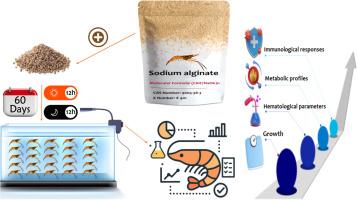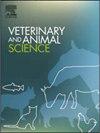饲料中海藻酸钠作为益生元对日本沼虾生长、生理、免疫、抗氧化和代谢的影响
IF 1.9
Q2 AGRICULTURE, DAIRY & ANIMAL SCIENCE
引用次数: 0
摘要
在为期60天的饲养试验中,研究了日粮中添加海藻酸钠对日本沼虾生长、血液学、免疫生理反应和代谢特性的影响。初始平均体重为1.47±0.05 g的对虾分别饲喂含有0.0(对照)、0.5、1.0、2.0和4.0 g/kg海藻酸钠的饲料。在所有检测的水质指标中,溶解氧(DO)是唯一随海藻酸钠添加水平的增加而显著升高的参数,在4.0 g/kg组出现了DO浓度的最大值(P < 0.05)。此外,与其他处理相比,2.0和4.0 g/kg海藻酸钠显著提高了对虾的生长指标和存活率(P < 0.05)。添加海藻酸钠后,血液生化指标普遍降低,而高密度脂蛋白(HDL)和低密度脂蛋白(LDL)水平升高(P < 0.05)。尽管谷胱甘肽过氧化物酶(GPx)、酸性磷酸酶(ACP)和碱性磷酸酶(AKP)活性在各组间无显著差异(P > 0.05),但大多数免疫参数和抗氧化酶活性在饲料干预下表现出正调节(P < 0.05)。饲粮中添加4.0 g/kg海藻酸钠显著提高了消化酶活性,促进了有益肠道菌群,改善了体组成(P < 0.05)。此外,海藻酸钠摄入量影响了与生长、免疫功能和代谢相关基因的表达(P < 0.05)。综上所述,本研究结果支持在日粮中添加4.0 g/kg海藻酸钠可优化日本沼虾的生长、生理状况和代谢健康。本文章由计算机程序翻译,如有差异,请以英文原文为准。

Impacts of dietary sodium alginate as a prebiotic on the oriental river prawn (Macrobrachium nipponense): A comprehensive analysis of growth, physiology, immunity, antioxidant, and metabolism
The effects of dietary sodium alginate supplementation on Macrobrachium nipponense were evaluated over a 60-day feeding trial, with emphasis on growth, hematological, immune-physiological responses, and metabolic characteristics. Juvenile prawns with an initial average weight of 1.47 ± 0.05 g were assigned to diets containing 0.0 (control), 0.5, 1.0, 2.0, or 4.0 g/kg sodium alginate. Among all the examined water quality indicators, dissolved oxygen (DO) was the only parameter that showed a statistically significant rise with increasing levels of sodium alginate supplementation, with the 4.0 g/kg group showing the maximum value of DO concentration (P < 0.05). Furthermore, growth metrics and survival rates (SR) were significantly enhanced in prawns receiving 2.0 and 4.0 g/kg sodium alginate compared to other treatments (P < 0.05). Hemato-biochemical indices generally decreased following sodium alginate supplementation, whereas levels of high-density lipoprotein (HDL) and low-density lipoprotein (LDL) were elevated (P < 0.05). Most immune parameters and antioxidant enzyme activities demonstrated positive modulation in response to the dietary intervention (P < 0.05), although glutathione peroxidase (GPx), acid phosphatase (ACP), and alkaline phosphatase (AKP) activities did not differ significantly among groups (P > 0.05). Diets supplemented with 4.0 g/kg sodium alginate notably enhanced digestive enzyme activities, promoted beneficial intestinal microbiota, and improved body composition (P < 0.05). Additionally, sodium alginate intake influenced the expression of genes associated with growth, immune function, and metabolism (P < 0.05). Overall, these findings support the dietary inclusion of 4.0 g/kg sodium alginate to optimize growth, physiological condition, and metabolic health in M. nipponense.
求助全文
通过发布文献求助,成功后即可免费获取论文全文。
去求助
来源期刊

Veterinary and Animal Science
Veterinary-Veterinary (all)
CiteScore
3.50
自引率
0.00%
发文量
43
审稿时长
47 days
 求助内容:
求助内容: 应助结果提醒方式:
应助结果提醒方式:


